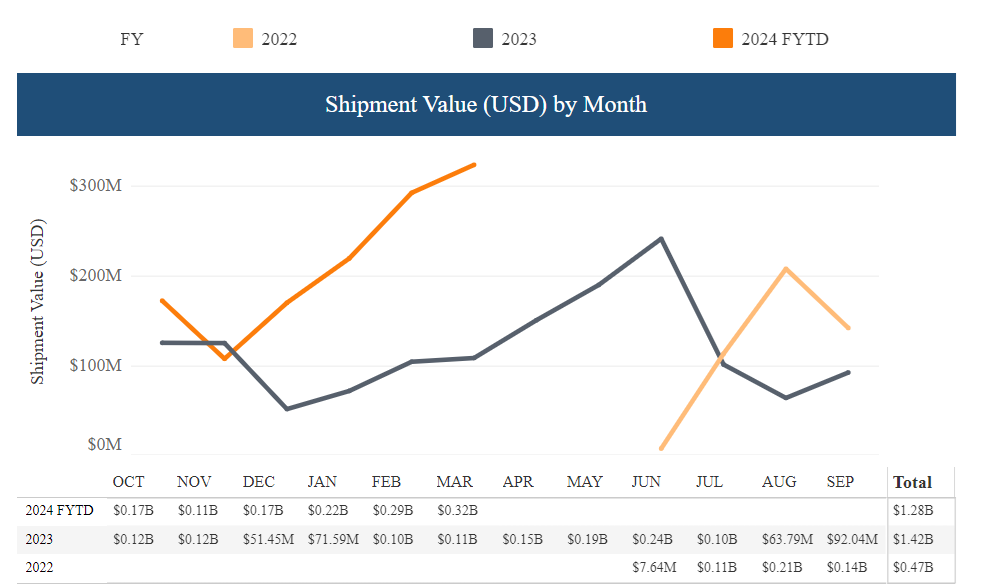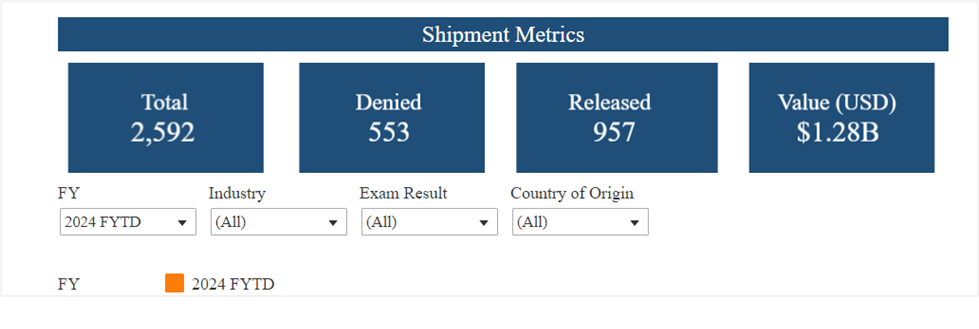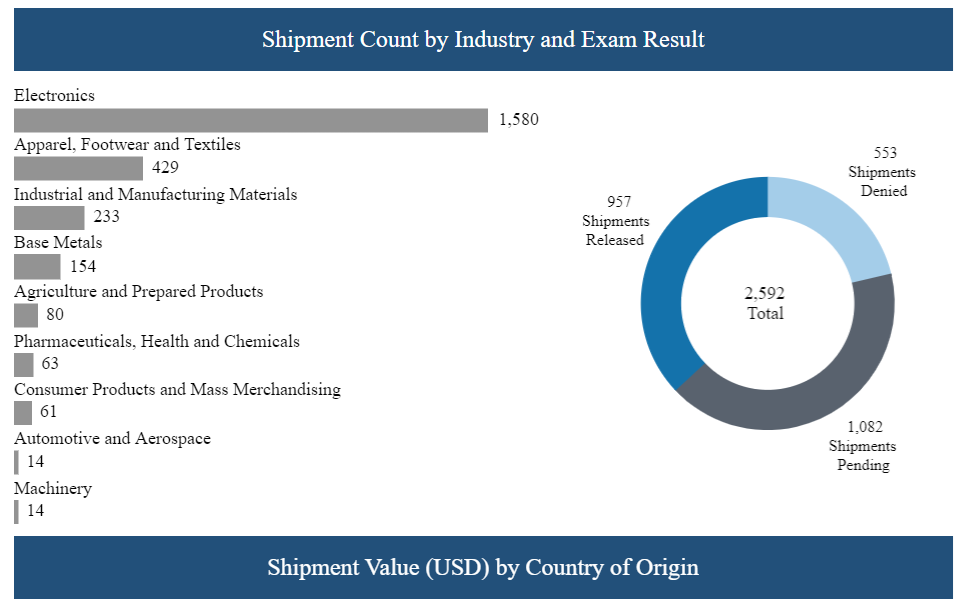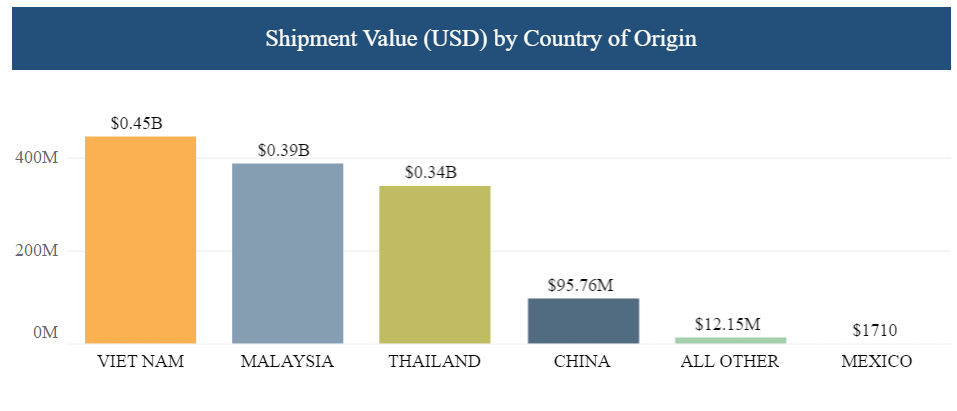Written by Jackson Wood, Director, Industry Solutions, Trade Compliance, Descartes Systems Group
U.S. Customs and Border Protection (CBP) has continued to expand and evolve the enforcement landscape of the Uyghur Forced Labor Prevention Act (UFLPA). This has been demonstrated by various new developments including the recent addition of several entities to the UFLPA Entity List and persistent pressure from U.S. lawmakers asking the Biden administration to strengthen UFLPA enforcement capabilities.
In CBP’s recent detention statistics, we already see a 45% increase in enforcement actions and a 300% increase in detained shipment value in early 2024 compared to the same period last year. With only the first quarter of the year passed, detained shipments’ value has reached $1.28 billion, while the previous two years combined were $1.98 billion.
UFLPA compliance is not optional. Imports suspected of using forced labor are highly likely to be detained or denied when transacting with those on the UFLPA Entity List.
We’ll explore more about the recent increase in enforcement actions and how your business can prevent forced labor from entering its supply chain.
Key Takeaways
- The UFLPA gives the CBP authority to seize any imports with ties to the Xinjiang region of China, which is known to use forced labor.
- The UFLPA Entity List details categorized organizations with ties to Xinjiang to give importers an updated reference list to screen against.
- Enforcement actions have increased significantly in 2024 as the U.S. government takes greater steps to prevent forced labor from entering the global supply chain.
- Failing to comply with UFLPA may result in detained and denied shipments, disrupting your business operations.
- Expansion of the UFLPA Entity List highlights the critical role that frequent and comprehensive denied party screening plays in protecting your organization and fighting against forced labor practices.
What is the UFLPA Entity List?
The UFLPA Entity List is a key element of the CBP’s forced labor enforcement toolkit, aiding in the prevention of goods made with forced labor from entering the U.S. The Uyghur Forced Labor Prevention Act (UFLPA) which went into effect in 2022, prohibits goods from being imported into the U.S that are either produced, in whole or in part, from materials in the Xinjiang Uyghur Autonomous Region (XUAR) or produced by certain entities identified on the UFLPA Entity List.
The Forced Labor Enforcement Task Force (FLETF), a specialized DHS-led task force of interagency partners, was formed to monitor the enforcement of the UFLPA restrictions. They are responsible for maintaining and updating the UFLPA Entity List.
For the FLETF to add an entity into the UFLPA Entity List, it must fall within one of the following criteria:
- Entities in Xinjiang that mine produce or manufacture wholly or in part any goods, wares, and merchandise with forced labor.
- Entities collaborating with the Xinjiang government to recruit, move, transfer, shelter, or take in forced labor, including Uyghurs, Kazakhs, Kyrgyz, or members of other groups facing persecution.
- Entities that exported products described in clause (iii) from the Peoples Republic of China into the United States.
- Facilities and entities that source materials from Xinjiang or from people working with the Xinjiang government or the Xinjiang Production and Construction Corps as part of programs like “poverty alleviation” or “pairing-assistance,” or other government-run programs that involve forced labor.
Ideally, the UFLPA Entity List will help importers across all industries more efficiently identify prohibited entities and promote supply chain compliance. However, products and materials that involve forced labor are still finding their way past Customs and Border Protection (CPB).
UFLPA Entity List Updates Show Push for Stronger Forced Labor Enforcement
At the creation of the UFLPA Entity List in June 2022, it comprised entities which were either the target of a previous CBP withhold release order (WRO) or included on the Entity List maintained by the Bureau of Industry and Security (BIS). However, recent additions have seen a shift in the status of the companies added, none of which had a pre-existing WRO nor were included in the BIS Entity List. These expansions to the UFLPA Entity List come on the heels of criticism from the U.S. Congress.
In January 2024, members of the U.S. Congress on the House Select Committee on the Chinese Communist Party (CCP) wrote a detailed letter urging for stronger enforcement of the UFLPA. The letter addresses several factors the committee believes undermine the UFLPA. Ultimately it calls for the expansion of the UFLPA Entity List to include companies outside of China profiting from Uygur forced labor, target industries that were not previously a high priority, as well as extend CBP scrutiny to imports that fall under the de minimis provisions.
This is the latest in a long line of congressional recommendations for policy changes to broaden the scope of the UFLPA and enhance its enforcement capabilities. Additionally, at the CBP’s 2024 Trade Facilitation and Cargo Security conference, a Department of Homeland Security policy adviser, Laura Murphy, stated that a substantial increase in the number of companies on the UFLPA Entity List should be anticipated. ‘We’re really focused on enhancing and expanding the entity list. We expect many more entities to be coming in the next few months,’ Murphy said.
With the Biden administration poised to expand the list of companies under import ban due to alleged ties to forced labor in China, businesses face mounting pressure to ensure UFLPA compliance. Enhanced due diligence is crucial, particularly for products and services originating from regions known to have a moderate or high risk of forced labor.
The Impact of the Uptick in UFLPA Enforcement
In the past two years, UFLPA Entity List and enforcement actions have prevented a significant number of products from entering the United States. According to CBP’s latest data, between June 2022 and March 2024, a total of 8,142 shipments at an estimated value of US$3.17 billion have been detained or denied entry under the act. The uptick in enforcement as seen in the chart below follows the recent shift in the FLETF’s enforcement strategy of the forced labor law.

Figure 1: CBP Statistics on the Value of Shipments Detained Since Imposition of UFLPA

Figure 2: UFLPA Enforcement Statistics Jan – Mar 2024
With only a few months into 2024, the value of affected shipments has exceeded $1 billion, a 45% increase when compared to the same period last year. This robust enforcement of the UFLPA recently impacted the supply chain of a major German car manufacturer. Thousands of vehicles were impounded in a U.S. port after it was found that a component in the vehicles was from “western China.” While the carmaker is currently working to replace the component as quickly as possible, deliveries of the impounded vehicles have been delayed, significant costs have been acquired along with damage to the manufacturer’s reputation.

Figure 3: CBP Statistics on Detained Shipment Count by Industry and Results
Based on the CBP data, the vast majority of detained shipments come from countries other than China. Although UFLPA targets the Xinjiang-Uyghur region, the stats in the chart below indicates that businesses need to focus on comprehensively mapping their supply chain to identify potential links to companies on the UFLPA Entity List and illegal transshipment of forced labor products.

Figure 3: CBP Statistics on Detained Shipment Value by Country of Origin
Organizations Must Enact Proactive Strategies to Ensure UFLPA Compliance
Proactive strategies to prevent issues will go far in ensuring importers receive their goods. These strategies include:
- Supply chain visibility: Building a resilient supply chain depends on full visibility into every link. Screening your direct suppliers is not enough; it’s critical to trace any indirect suppliers on the UFLPA Entity List to maintain compliance.
- Denied party screening: Integrating comprehensive denied party screening with extensive global watchlists into key processes, such as onboarding new suppliers, allows you to preemptively avoid transacting with an entity known to use forced labor.
- Sanctioned ownership screening: International exporters have been linked to designated entities via business ownership. Identifying these entities requires resources beyond the UFLPA Entity List in order to trace ownership structures.
- Proactively maintain detailed documentation of due diligence: Given the presumptive nature of the law, actively collecting, and updating documentation that demonstrates your goods comply with UFLPA Entity List and other forced labor standards will safeguard your business. In the event of a CBP admissibility review this will allow prompt response to prove your compliance.
- Take a risk-based approach for high-priority sectors: The current high-priority list has been detailed in the UFLPA Enforcement Strategy document, which contains the following sectors:
- Apparel
- Electronics
- Cotton and cotton products
- Tomatoes
- Silica-based products
- Downstream products
CBP enforces UFLPA across all sectors and focuses on wholly or partially manufactured goods in Xinjiang or produced by an entity on the UFLPA Entity List — regardless of sector. Recent data indicates automobile components, batteries, steel, and copper are also becoming a priority focus.
The purpose of designating high-priority sectors is to develop strategies for importation of these categories. CBP’s risk assessment processes dynamically consider several data sources when deciding how to process a shipment, and designated high-priority sectors are one data point taken under consideration.
Businesses within any high-priority sectors will likely benefit from thorough denied party screening to identify any restricted suppliers prior to importing products. As these sectors may be detained more frequently, having confidence in your partners is critical to receiving shipments and maintaining UFLPA compliance.
Establishing or refining your UFLPA compliance strategies can take time and resources, but it can be simplified with the right partner, and you will avoid having shipments detained and denied during importation. Otherwise, you may end up with lost funds, business disruption, and reputation damage.
Prevent UFLPA Risks with Descartes Forced Labor Compliance Solutions
Complying with UFLPA, sanctions, and other trade regulations is not optional. Failing to conduct enhanced due diligence can result in delayed or denied shipments, with negative impacts on your business.
To ensure comprehensive UFLPA compliance and risk mitigation in your supply chain, Descartes offers forced labor compliance solutions that extend beyond the UFLPA Entity List to include other denied and restricted party lists like the BIS entity list. Our platform allows you to automatically screen new partners, conduct daily rescreening to stay on top of changes, and provides additional data to uncover sanctioned ownership structures.
Schedule a demo today to see how our solutions can empower you to screen against UFLPA entity list, as well as get greater transparency of 3rd party risk and visibility into your supply chain.
Additionally, you can read what our customers are saying about Descartes Denied Party Screening on G2 – an online third- party business software review platform. Or explore this testimonial ebook to see why we are listed among the Top 50 Best Software for Enterprises.


